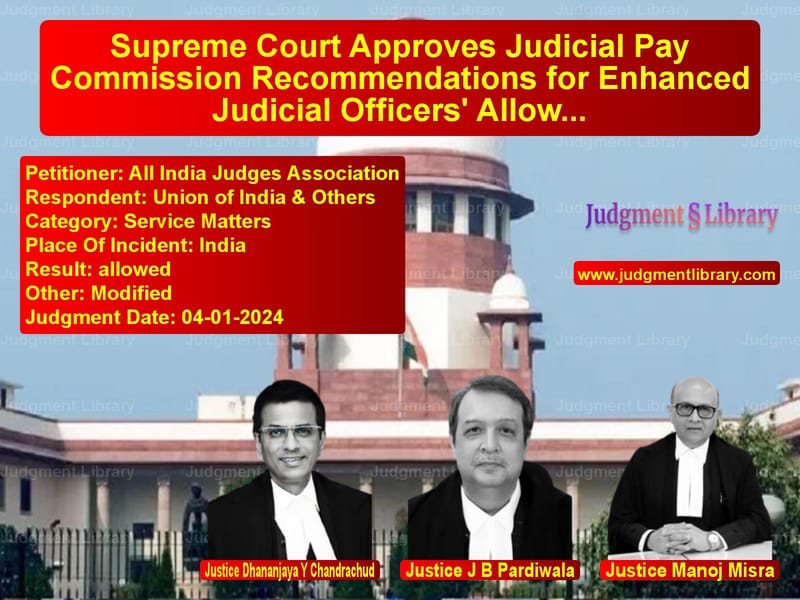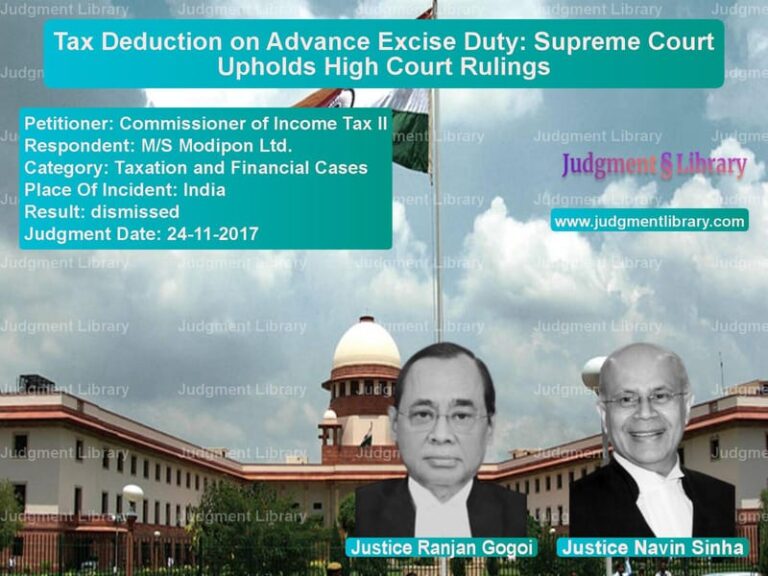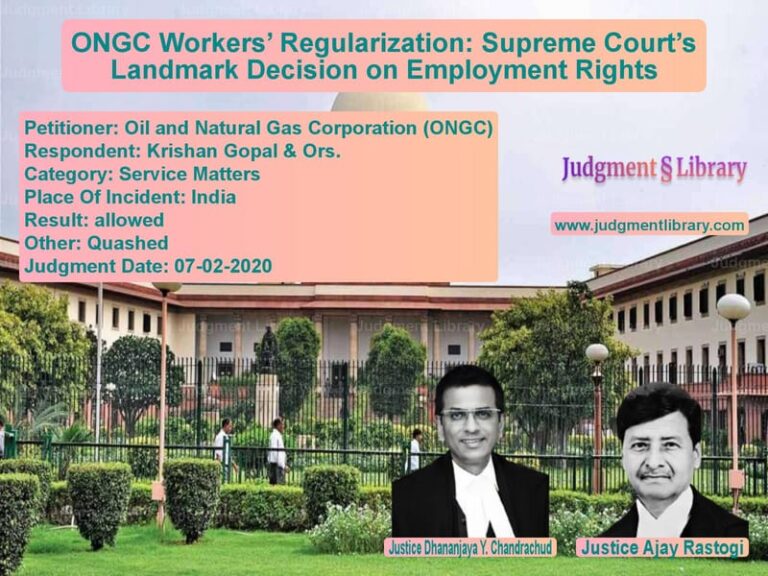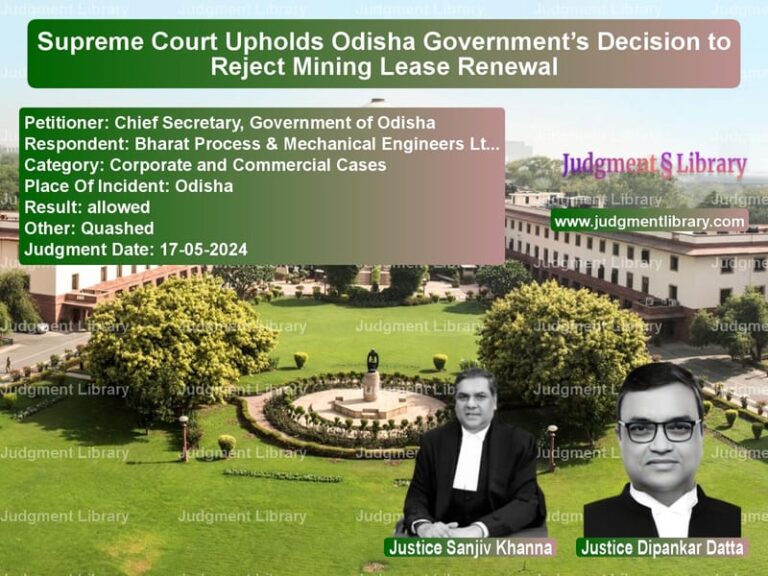Supreme Court Approves Judicial Pay Commission Recommendations for Enhanced Judicial Officers’ Allowances
The Supreme Court of India, in a landmark judgment, has accepted the recommendations of the Second National Judicial Pay Commission (SNJPC), providing a significant boost to the salaries, allowances, and pensions of judicial officers across the country. The decision settles long-standing demands for better service conditions, emphasizing the importance of ensuring financial security and dignity for members of the judiciary.
Background of the Case
The All India Judges Association filed a writ petition seeking the implementation of improved pay structures and allowances for judicial officers. The Supreme Court had previously constituted various Judicial Pay Commissions to assess and recommend necessary revisions in judicial service conditions. The SNJPC, chaired by Justice P.V. Reddy, submitted its report, which formed the basis of the Court’s final ruling.
Petitioners’ Arguments
The All India Judges Association and other petitioners contended:
- Judicial officers perform a crucial constitutional function and should receive allowances on par with All India Services officers.
- The financial burden argument made by state governments should not be used to deny rightful benefits to judges.
- There is an urgent need to enhance judicial pay to attract and retain talented legal professionals in the judiciary.
- Allowances such as house rent, medical benefits, transport, and education allowances should be provided at improved rates.
Respondents’ Arguments
The Union of India and various state governments opposed the recommendations, raising concerns such as:
- The increased financial burden on states due to higher judicial pay scales.
- The argument that judicial officers should not receive allowances greater than those given to state administrative officials.
- Existing allowances for judicial officers were already sufficient and did not require major revision.
Supreme Court’s Ruling
The Court, after reviewing the SNJPC recommendations and hearing both parties, issued a decisive ruling in favor of judicial officers. The key directives include:
1. Revised Pay Structure
- Judicial officers to receive pay scales linked to inflation and cost-of-living adjustments.
- Pay structure to remain distinct from state government employees to maintain judicial independence.
2. House Rent and Residential Quarters
- Judicial officers without government accommodation will receive enhanced House Rent Allowance (HRA).
- Residential quarters to be constructed for judicial officers in all districts.
- A furniture and air conditioner allowance of Rs. 1.25 lakh every five years.
3. Medical Allowance
- Fixed medical allowance increased to Rs. 3,000 per month for serving officers and Rs. 4,000 per month for pensioners.
- Direct access to empaneled private hospitals for treatment.
- Provision for cashless medical treatment for retired judicial officers.
4. Children’s Education Allowance
- Judicial officers to receive Rs. 2,250 per month per child for education.
- Hostel subsidy of Rs. 6,750 per month.
5. Transport Allowance
- Allowance of Rs. 10,000 per month for judges who own a car, increasing to Rs. 13,500 from 2021.
- 100 liters of petrol reimbursement per month in cities; 75 liters in other areas.
- District judges and select judicial officers to receive official vehicles.
6. Special Pay for Administrative Work
- Principal District Judges: Rs. 7,000 per month.
- Other district judges with administrative duties: Rs. 3,500 per month.
7. Risk Allowance
- Judicial officers posted in insurgency-prone areas, including Jammu & Kashmir and parts of the North-East, to receive risk allowance equivalent to civilian government officials.
8. Leave Travel Concession (LTC)
- Judicial officers entitled to LTC once every three years.
- Air travel permitted for all judicial officers.
- Judicial officers allowed to carry forward LTC beyond retirement for one year.
9. Institutional Reforms
- The Supreme Court ordered the creation of a Committee for Service Conditions of the District Judiciary (CSCDJ) in each High Court.
- The committee will oversee the implementation of revised pay scales and allowances.
- It will also handle grievances related to pay, pension, and service conditions.
Impact of the Judgment
The Supreme Court’s ruling marks a major victory for judicial officers across India, ensuring that they receive financial benefits commensurate with their responsibilities. The key takeaways from this judgment include:
- Recognizing the judiciary as a unique pillar of governance requiring distinct service conditions.
- Preventing financial insecurity among judicial officers to safeguard judicial independence.
- Ensuring parity with All India Services officers to attract competent candidates to the judiciary.
- Establishing a structured mechanism to address future concerns regarding pay and allowances.
Conclusion
The Supreme Court’s decision to approve the SNJPC recommendations is a step towards strengthening the Indian judiciary. By ensuring financial stability and dignity for judicial officers, the Court has reaffirmed its commitment to maintaining the independence and efficiency of the judicial system.
Petitioner Name: All India Judges Association.Respondent Name: Union of India & Others.Judgment By: Justice Dhananjaya Y Chandrachud, Justice J B Pardiwala, Justice Manoj Misra.Place Of Incident: India.Judgment Date: 04-01-2024.
Don’t miss out on the full details! Download the complete judgment in PDF format below and gain valuable insights instantly!
Download Judgment: all-india-judges-ass-vs-union-of-india-&-oth-supreme-court-of-india-judgment-dated-04-01-2024.pdf
Directly Download Judgment: Directly download this Judgment
See all petitions in Employment Disputes
See all petitions in Public Sector Employees
See all petitions in Recruitment Policies
See all petitions in Pension and Gratuity
See all petitions in Judgment by Dhananjaya Y Chandrachud
See all petitions in Judgment by J.B. Pardiwala
See all petitions in Judgment by Manoj Misra
See all petitions in allowed
See all petitions in Modified
See all petitions in supreme court of India judgments January 2024
See all petitions in 2024 judgments
See all posts in Service Matters Category
See all allowed petitions in Service Matters Category
See all Dismissed petitions in Service Matters Category
See all partially allowed petitions in Service Matters Category







